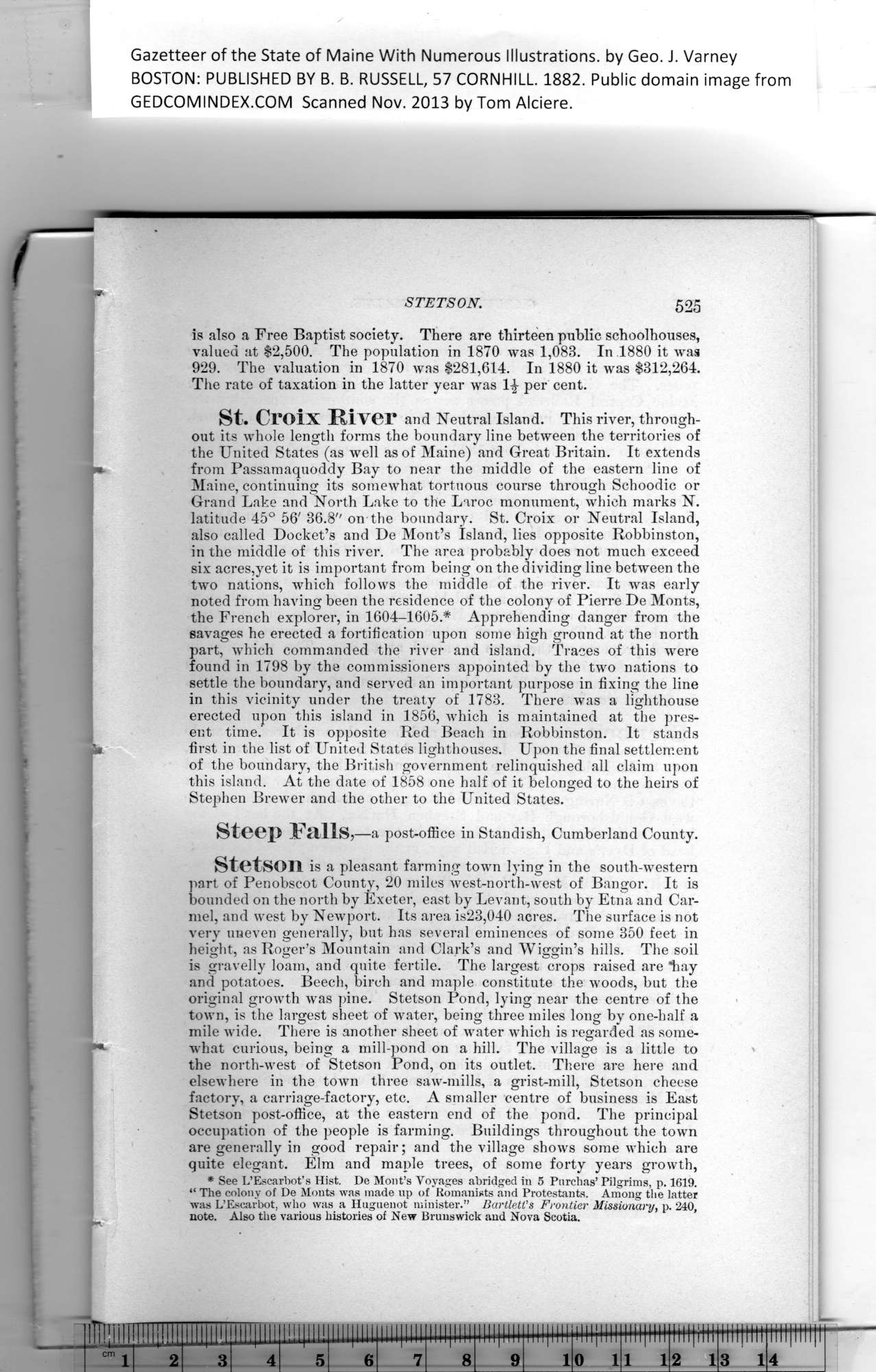|
Gazetteer of the State of Maine With Numerous Illustrations, by Geo. J. Varney
BOSTON: PUBLISHED BY B. B. RUSSELL, 57 CORNHILL. 1882. Public domain image from
STETSON. 525
is also a Free Baptist society. There are thirteen public schoolhouses,
valued at $2,500. The population in 1870 was 1,088. In 1880 it was
929. The valuation in 1870 was $281,614. In 1880 it was $312,264.
The rate of taxation in the latter year was \\ per cent.
St. Croix River and Neutral Island. This river, through-
out its whole length forms the boundary line between the territories of
the United States (as well as of Maine) and Great Britain. It extends
from Passamaquoddy Bay to near the middle of the eastern line of
Maine, continuing its somewhat tortuous course through Schoodic or
Grand Lake and North Lake to the Laroc monument, which marks N.
latitude 45° 56' 36.8" on the boundary. St. Croix or Neutral Island,
also called Docket’s and De Mont’s Island, lies opposite Robbinston,
in the middle of this river. The area probably does not much exceed
six acres,yet it is important from being on the dividing line between the
two nations, which follows the middle of the river. It was early
noted from hatdng been the residence of the colony of Pierre De Monts,
the French explorer, in 1604-1605.* Apprehending danger from the
savages he erected a fortification upon some high ground at the north
part, which commanded the river and island. Traces of this were
found in 1798 by the commissioners appointed by the two nations to
settle the boundary, and served an important purpose in fixing the line
in this vicinity under the treaty of 1783. There was a lighthouse
erected upon this island in 1856, which is maintained at the pres-
ent time.’ It is opposite Red Beach in Robbinston. It stands
first in the list of United States lighthouses. Upon the final settlement
of the boundary, the British government relinquished all claim upon
this island. At the date of 1858 one half of it belonged to the heirs of
Stephen Brewer and the other to the United States.
Steep Falls,—a post-office in Standish, Cumberland County.
Stetson is a pleasant farming town lying in the south-western
part of Penobscot County, 20 miles west-north-west of Bangor. It is
bounded on the north hy Exeter, east by Levant, south by Etna and Car-
mel, and west by Newport. Its area is23,040 acres. The surface is not
very uneven generally, but has several eminences of some 350 feet in
height, as Roger’s Mountain and Clark’s and Wiggin’s hills. The soil
is gravelly loam, and quite fertile. The largest crops raised are liay
and potatoes. Beech, birch and maple constitute the woods, hut the
original growth was pine. Stetson Pond, lying near the centre of the
town, is the largest sheet of water, being three miles long by one-half a
mile Avide. There is another sheet of water which is regarded as some-
Avhat curious, being a mill-pond on a hill. The village is a little to
the north-west of Stetson Pond, on its outlet. There are here and
elseAvhere in the toAvn three satv-mills, a grist-mill, Stetson cheese
factory, a carriage-factory, etc. A smaller centre of business is East
Stetson post-office, at the eastern end of the pond. The principal
occupation of the people is farming. Buildings throughout the town
are generally in good repair; and the village shows some Avhich are
quite elegant. Elm and maple trees, of some forty years growth,
* See L’Escarbot’s Hist. De Mont’s Voyages abridged in 5 Pnrchas’ Pilgrims, p. 1619.
“ The colony of De Monts was made up of Romanists and Protestants. Among the latter
was L’Escarbot, who was a Huguenot minister.” Bartlett's Frontier Missionary, p. 240,
note. Also the various histories of New Brunswick and Nova Scotia.
PREVIOUS PAGE ... NEXT PAGE
This page was written in HTML using a program written in Python 3.2
|
